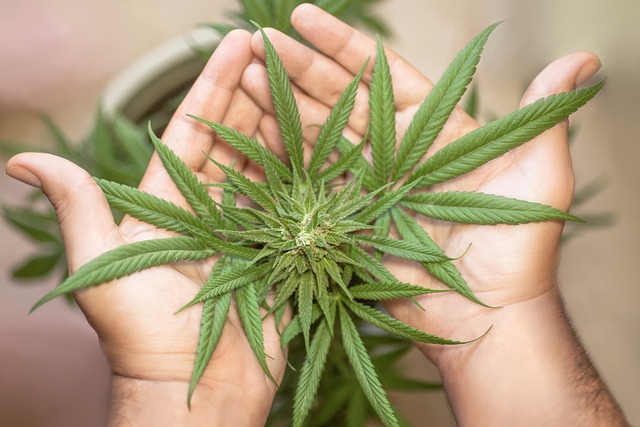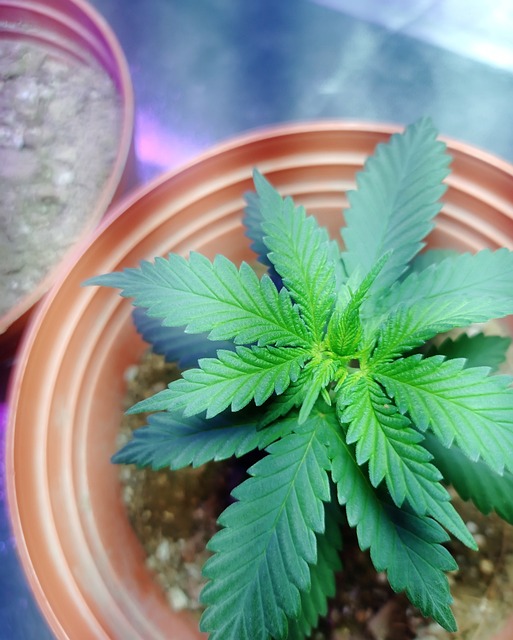In Michigan, THCA (Tetrahydrocannabinolic Acid), a non-psychoactive compound found in cannabis and precursor to THC, has been legally recognized for its therapeutic potential. The state's Medical Marihuana Act allows patients with qualifying conditions to access THCA under a doctor's recommendation, with the Michigan Regulation and Taxation of Marihuana Act regulating its sale through licensed dispensaries and cultivators. Users must adhere to possession limits, avoid public consumption, and never drive under the influence. As one of the most progressive states in the U.S. regarding cannabis, Michigan not only permits THCA use for medical purposes but also for adult-use recreationally. THCA flowers are particularly favored due to their anti-inflammatory and pain-relieving effects without psychoactive side effects. For those interested in cultivation, it's essential to comply with state regulations, including obtaining the right licensing and adhering to the Michigan Regulation and Tax Act guidelines. Consumption methods like vaporizing at specific temperatures or preparing edibles can activate THCA's benefits, while decarboxylation is key to transforming it into THC for those seeking its psychoactive effects. As the legal status of THCA continues to be defined and refined, staying informed about the evolving regulations in Michigan remains critical for both users and cultivators.
Exploring the nuanced landscape of cannabis derivatives, this article delves into the burgeoning interest surrounding THCA flowers—a subject that’s gaining traction, particularly within Michigan’s evolving regulatory environment. We’ll navigate the legal parameters governing THCA flower usage in the state and uncover its potential effects and benefits, backed by cultivation insights tailored for Michigan’s unique climate. Additionally, we’ll outline optimal consumption methods and best practices to maximize THCA flowers’ efficacy within the context of Michigan’s progressive legal framework. Join us as we shed light on this transformative cannabinoid and its role in the evolving world of wellness and botanical exploration.
- Exploring THCA Flower Legality and Usage in Michigan
- Understanding THCA Flowers: Effects, Benefits, and Cultivation in Michigan
- Maximizing the Potential of THCA Flowers: Consumption Methods and Best Practices in Michigan's Legal Framework
Exploring THCA Flower Legality and Usage in Michigan

In recent years, the legal landscape surrounding cannabis and its derivatives has seen significant changes, particularly with the emergence of THCA (Tetrahydrocannabinolic Acid), a non-psychoactive precursor to THC (Tetrahydrocannabinol). As of the latest updates, THCA is legal in Michigan under specific conditions. Michigan’s Medical Marihuana Act has paved the way for patients with qualifying conditions to use and possess marijuana products, including THCA flowers, with a doctor’s recommendation. These flowers are prized for their potential therapeutic benefits, as they contain high levels of CBD and only trace amounts of psychoactive THC. The state’s regulatory framework requires that these products be purchased from licensed dispensaries or cultivators, ensuring compliance with the Michigan Regulation and Taxation of Marihuana Act. Users must adhere to possession limits and must not consume cannabis in public places or operate vehicles while under the influence.
Michigan’s progressive stance on cannabis has positioned it as a leading state in the United States for both medical and adult-use cannabis. THCA flowers are gaining popularity due to their versatility, as they can be consumed in various ways, including smoking, vaporizing, or infused into edibles. Users often prefer THCA over other cannabinoids due to its potential to provide relief from inflammation, pain, and certain symptoms without the intense psychoactive effects associated with THC. However, it’s important for consumers to stay informed about the evolving regulations at both state and federal levels, as the legal status of THCA flowers can change. Users should always verify that they are purchasing legally compliant products from reputable sources within Michigan to ensure their safety and legality.
Understanding THCA Flowers: Effects, Benefits, and Cultivation in Michigan

In recent years, THCA flowers, rich in tetrahydrocannabinolic acid, have garnered attention for their potential wellness effects and therapeutic properties. THCA is the non-psychoactive precursor to THC, the primary psychoactive component found in cannabis. As such, THCA flowers are sought after for their medicinal benefits without the intoxicating effects associated with THC. In Michigan, where cannabis legislation has evolved, THCA flowers have become a focus of both medical and recreational users due to their legal status. The state’s comprehensive medical marijuana program, which allows for the use of cannabis products that contain THCA, has facilitated research into its benefits, including pain relief, anti-inflammatory properties, and potential neuroprotective effects. For those interested in cultivating THCA flowers in Michigan, it’s essential to adhere to state regulations, which include licensing and compliance with the Michigan Regulation and Tax Act if engaged in commercial activities. Home growers should familiarize themselves with the legal limits for personal use. The cultivation of these flowers requires specific conditions such as optimal light exposure, temperature control, and soil quality to produce a high-quality THCA-rich product. Understanding the nuances of THCA flower cultivation is crucial for both hobbyists and commercial growers in Michigan, ensuring they can maximize the benefits of this unique cannabinoid while remaining compliant with state laws.
Maximizing the Potential of THCA Flowers: Consumption Methods and Best Practices in Michigan's Legal Framework

In Michigan, where THCA flowers have been legally recognized for their potential therapeutic benefits, enthusiasts and consumers are exploring innovative ways to maximize the effects of these cannabinoid-rich blooms. THCA, or tetrahydrocannabinolic acid, is the raw form of THC and is gaining attention for its non-psychoactive properties at certain temperatures, offering a unique experience for those seeking the health benefits associated with cannabis without intense psychoactive effects. To harness the full potential of THCA flowers within Michigan’s legal framework, it’s crucial to understand the best consumption methods and practices.
Decarboxylation is a critical step in activating the THCA into THC, which can then produce psychoactive effects if heated above a certain temperature. This process can be achieved through various methods, including vaporizing at specific temperatures, edibles preparation, or smoking after proper drying and curing. When vaporizing, precise temperature control is essential to convert THCA to THC without combustion, preserving the plant’s medicinal properties. For those preferring edibles, careful dosing and ingredient selection are key to creating a safe and effective product. In Michigan, where the legal landscape is evolving, it’s important to stay informed about regulations that govern the use of THCA flowers, ensuring compliance with state laws while optimizing the experience. Whether through vaporization or culinary creations, consumers in Michigan have access to these legal cannabis products, offering a wide array of therapeutic options tailored to their preferences and needs.
In conclusion, the emergence of THCA flower tips as a focal point within Michigan’s evolving landscape of cannabis consumption and cultivation underscores the potential benefits and experiences available to residents and visitors alike. With the legality of THCA flowers firmly established in Michigan, enthusiasts can explore their effects and enjoy their unique properties responsibly. The insights provided into cultivation and optimal consumption methods offer a comprehensive guide for those looking to maximize the potential of THCA flowers within the state’s supportive legal framework. As interest in cannabinoid-rich products continues to grow, staying informed on the nuances of THCA legal status and usage in Michigan remains crucial for anyone interested in this burgeoning sector.
